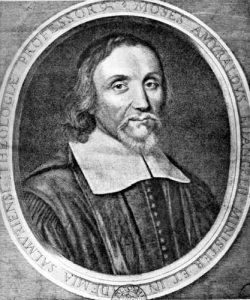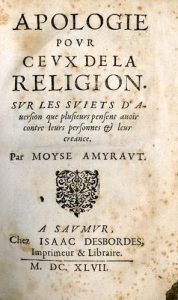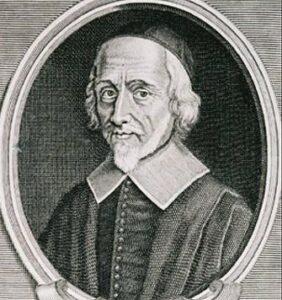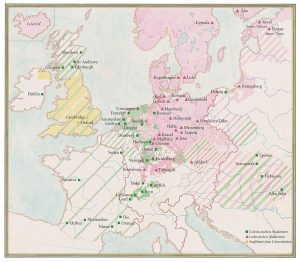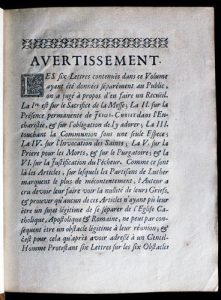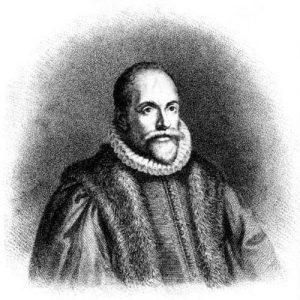Amyraut was a typical example of the reformed humanism associated with the « Saumur School »
Moyse Amyraut was born in Bourgueil (Touraine) in 1596.
He studied law followed by theology in Saumur, where he was later a minister and in 1633 he was appointed professor of the protestant Academy.
He spent most of his life in Saumur and died there on 13th January 1664.
The Academy of Saumur was created by Philippe du Plessis-Mornay in 1599 and his ideal of moderation influenced this establishment right from the beginning. It became a well known highly respected place of learning in the XVII century, advocating what could be best described as reformed humanism, of which Amyraut was a typical example. He had a reputation for being broadminded, moderate and tolerant.
At the Saumur Academy, theology, historical research, philology and political thought were all influenced by humanism.
After the treaty of Alès (1629) protestants, who no longer had their armed strongholds or political privileges, had to display great intellectual prowess to be able to survive in French society.
They tried to defend the Edict of Nantes and to show that they were in no way creators of disorder or subversion.
From 1634 to 1644, Amyraut revived the old debate in the reformed world over the theme of predestination - his own view, however, was a conciliatory one
His book : A short treatise on predestination and the principal arguments in its defence (Saumur, Lesnier and Desbordes, 1634) stirred up dissent amongst the reformers over the theme of predestination. Indeed, from 1618 to 1619, a synod had taken place in Dordrecht (Holland) to try and resolve the problem of the theses of Arminius (1560-1609), which contested the Calvinist official doctrine of double predestination. His followers advocated the idea of a responsible, personal faith in salvation. The disciples of François Gomaris (1563 – 1641), however, upheld the idea that this divine decree of predestination left no room for the human will in matters of salvation. In Dordrecht the Gomarian position was approved of and Arminius’ system denounced as wrong. In 1620 the synod of Alès approved of the decisions which had been taken in Dordrecht.
Amyraut was a disciple of the Scot John Cameron (1580-1625). He met him in Saumur between 1618 and 1620 and was also one of his students. Greatly influenced by his teacher’s ideals of moderation, Amyraut strived to achieve reconciliation between the two opposed groups.
His principle was that salvation was accessible to all, providing that they have faith : God wanted salvation for all men but did not necessarily give faith in Christ to every man, although this was a prerequisite for salvation.
This standpoint deeply divided many reformers – while the pastors of Charenton defended Amyraut, angry disagreement was expressed in the Netherlands and Saintonge ; in Sedan, it was especially Pierre Du Moulin (1568 – 1658), professor at the Academy, who contested these ideas.
In 1637, the synod of Alençon supported Amyraut and even though at the synod of Charenton he was again under attack. The argument died down gradually as interest in the subject waned. Amyraut’s moderation, tolerance and broadmindedness led to a revival in reformed theology.
His writings were prolific and greatly admired
Amongst his many writings can be found theology, ethics, exegesis and even polemics.
His major works are :
- A treatise on religions, confuting those who think that there exists no difference between them, (Saumur, 1631).
- A short treatise on predestination and the principal arguments in its defence, (Saumur, 1634).
- A discourse on the state of believers after death, (Saumur, 1646), written after the death of his daughter Elizabeth.
- An Apologia in defence of the Reformed Religion, (Saumur, 1647) – this was written to justify the political actions of the French reformers, to show that they did not in any way want to stir up disorder or subversion. He stated that they did not contest the king’s authority nor aim at setting up a State within a State.
- Christian ethics, 6 vol. (Saumur, 1652-1660).
- In favour of the government of the Church, as opposed to the abolition of synods and their authority, Saumur, 1653). In this work, Amyraut defended the best and wisest system of ecclesial government : the presbyterian-synodical structure.
- The life of François de la Noue, from the beginning of religious troubles in 1560 until his death, (Leyden, 1661).

